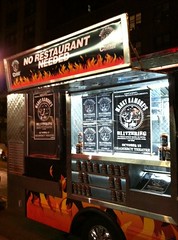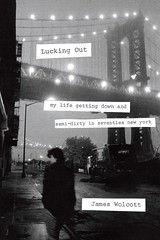 Courtesy of Cruisin’ Kitchen
Courtesy of Cruisin’ KitchenCBGB will be all over the place this summer, and so will a new truck bearing the name of one of the club’s legends. Marky Ramone’s Cruisin’ Kitchen hit the streets about two weeks ago, and the owner, a former East Villager, plans to feed the neighborhood’s late-night hordes.
Keith Album, a French Culinary Institute grad who has worked in catering, as a personal chef, and most recently at Whole Foods, describes his concept as “worldwide balls,” with Marky Ramone’s signature marinara sauce slathered over the Italian variety.
Not only that: the former Ramones drummer’s name and likeness are plastered on the side of the truck. Read more…
This nugget of news from an online auction house fits right in with the upscaling of The Bowery. City Room reports that a leather jacket once worn by drummer Marky Ramone (of The Ramones, obviously) is currently going for $3,146. An employee at the auction house says that it does not come with any lingering odors of stage sweat. Meanwhile, a more affordable option for Ramones fans: the new Dee Dee and Johnny Wacky Wobblers.
 Courtesy of Doubleday
Courtesy of Doubleday Luckily for East Villagers, James Wolcott’s memoir of his days as a young culture critic in a now nearly vanished city, “Lucking Out: My Life Getting Down and Semi-Dirty in Seventies New York,” places much of its meat and potatoes (along with plenty of gravy) right here in our very own backyard. Steering a middle course between the sometimes overly concentrated, every-word-counts prose of his Vanity Fair columns, and the more loosey-goosey style he deploys in his blog at the same publication, Mr. Wolcott reconfirms his position as New York’s wittiest critic.
Despite its pleasing portability (the book, out later this month, comes in at about 270 pages), “Lucking Out” covers plenty of ground, bopping from Mr. Wolcott’s mice-ridden “man-cave” on East 12th Street, down to CBGB, and back up to the Village Voice, where he made his name. It slides west for a gawk at the gay heyday of the West Village, then uptown for some quality time among the balletomanes of Lincoln Center (with a pause for skuzzy “Taxi Driver”-era Times Square porn along the way), and includes countless screening room séances with his mentor and muse, the late New Yorker film critic, Pauline Kael, to whom large portions of the book can be seen as an extended and touching valentine. Read more…





